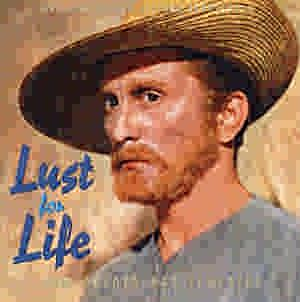************************************************************** EDITOR’s RECOMMENDATION May 2002 **************************************************************
Mikló RÓZSA
Lust for Life
OST
FILM SCORE MONTHLY Vol. 5 No. 1 [68:57]
Available from Film Score Monthly, 8503 Washington Boulevard, Culver City, CA90232; Tel: 1-888-345-6335; overseas: 310-253-9595; fax: 310-253-9588;
Email: Info@filmscoremonthly.com

Cast against type, Kirk Douglas, nevertheless, turned in a fine sensitive, anguished Oscar-nominated performance as the tormented post-impressionist painter, Vincent van Gogh in the 1956 Vincent Minelli-directed biopic Lust for Life. The film also received Oscar nominations for the adapted screenplay of Norman Corwin and for its art direction. Anthony Quinn won the supporting actor Oscar for his 8-minute role as Gauguin. Although he was not included amongst the Oscar honours, Miklós Rózsa always considered his score to be amongst his finest creations for the screen.
Rózsa's score, reproduced here in its entirety thanks, once again, to the enterprise of Film Score Monthly, is a mix of dark intensity to underscore the many tragic scenes of van Gogh's struggles, his relationship disappointments, his deprivation, his loneliness and his ultimate madness; and Rózsa's beautiful evocations of the Dutch and French countrysides through the changing seasons in cues like: 'Light and Colour', 'Orchards', 'Summer' and 'Mistral'. 'Postman Roulin', one of Van Gogh's character models gives Rózsa the opportunity to express a little light relief – a portrait both pompous and comical. In one glorious melody (in 'Inertia' and 'False Hopes'), Rózsa manages to sum up both the tragic struggle of Van Gogh's life and the lasting triumph of his art.
The best account of his music comes from Rózsa, himself. He wrote: "He [Van Gogh] was a post-impressionist but post-impressionism in music comes much later than Van Gogh's death at the end of the 19th century; pictorial trends are always between 25 and 40 years ahead." [In fact Debussy's Prélude à l'après midi d'un faun was not heard until after the painter's death.] Nevertheless, Rózsa chose to follow identifiable artistic relationships rather than literal ones. He said: "The music he [Van Gogh] himself knew would have been that of the 1880s: Wagner, Liszt, César Franck - but I felt that mid-19th century romanticism had little in common with his work. Somehow I had to evolve a suitable style in terms of my own music. It had to be somewhat impressionistic, somewhat pointillistic, somewhat post-romantic and brightly, even startlingly colourful, much like the tenor of his paintings."
As is customary with Film Score Monthly restorations, there are a number of bonus tracks including some 'oompah-oompah' town band source material, and café music.
The documentation is, as usual, very comprehensive in its detail about the film and in its analysis of the score.
Essential listening for every Miklós Rózsa fan.
Ian Lace

Gary Dalkin adds:
Once again Ian has said really all that needs to said about this great score, transferred to CD to a standard we could never have even hoped for a decade or so ago. Superb sound, considering the 1955 recording date, and a splendid booklet. In a great month for classic score issues this really is another one to add to your collection if you can at all afford it. Though with Rózsa's King of Kings also just out, plus definitive issues of Goldsmith's Logan's Run and Williams' ET, this could prove an expensive time. To say nothing of Williams' new Attack of the Clones and the very fine Benjamin Frankel anthology, The Importance of Being Ernest just out on CPO. Perhaps its time for a word with the bank manager.
Gary S. Dalkin

Return to Index